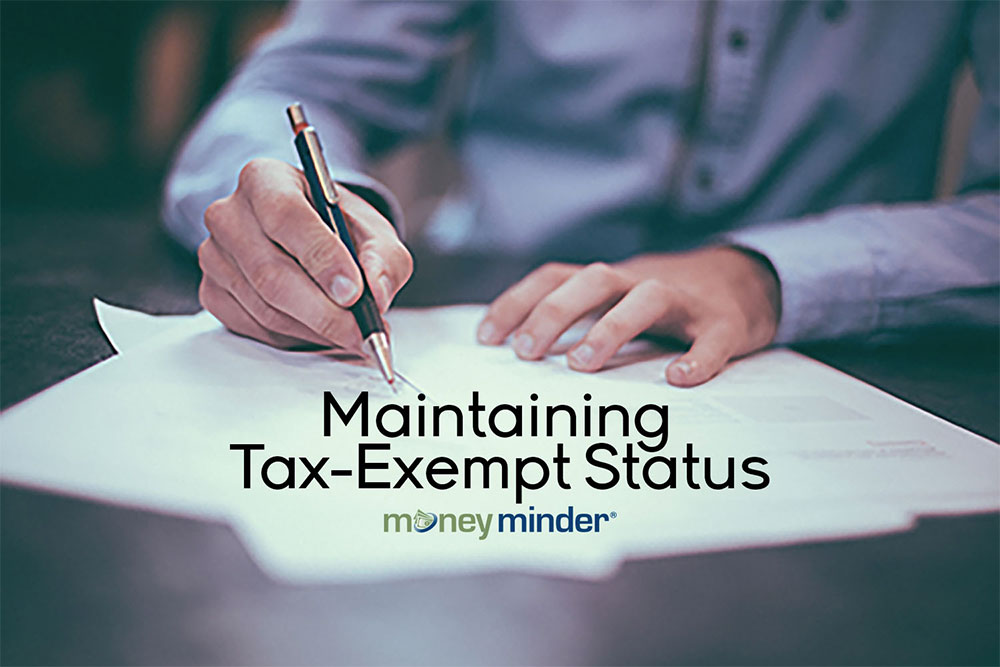Whether your organization has been tax-exempt from day one or it is a recent change, you have come to this post for a great reason: maintaining your tax-exempt status. There are many benefits to being a tax-exempt organization. The obvious ones being federal tax exemption, tax-deductible contributions and sometimes exemption from employee tax. This status allows organizations, such as nonprofits, to spend money where needed, instead of on taxes. If you are able to achieve this status, you will want to do everything you can in order to maintain it.
Obtaining Tax-Exempt Status
As you may recall when you set up your nonprofit to begin with, in order to obtain tax-exempt status, you must complete an IRS Form 1023 application for Recognition of Exemption. Organizations with gross receipts between the amounts of $50,000 to $250,00 are eligible for Form 1023-EZ. Form 1023-EZ is a simplified version that must be submitted digitally.
Keeping Your Tax-Exempt Status Year-Over-Year

Once you obtain tax-exempt status, you will need to follow a few tips to maintain it. Such as:
- Stay out of politics. Nonprofit 501(c)(3) corporations cannot donate or show support to any political campaigns, this will allow the IRS to revoke tax-exempt status. The reasoning behind this is that such an endorsement could possibly affect the outcome of an election.
- Keep clean books. Nonprofit bookkeeping is a must regardless of your tax status. But to maintain tax-exempt status, also keep a detailed account of unrelated income. This is money that was given to your organization from activities that are not related to your mission, such as the sale of inventory or consulting fees. It’s also important to understand your nonprofit’s finances and taxes such as 990 forms. In addition, you must register your organization if you are soliciting donations. Failure to register can cause fees and civil or criminal penalties.
- Watch out for red-flag transactions. Any transactions that benefit an officer, director or another key position raises red flags with the IRS. Any reimbursements to internal employees or volunteers should be reasonable. This is to avoid what the IRS calls “excess benefit transaction.”
Keeping your tax-exempt status should be a top priority for your organization. It may seem like extra work, but it is worth it.

 Connect your Venmo account to MoneyMinder PRO to directly download transactions, saving you time and effort. You just review the transactions to ensure they are properly categorized and fill out any required fields.
Connect your Venmo account to MoneyMinder PRO to directly download transactions, saving you time and effort. You just review the transactions to ensure they are properly categorized and fill out any required fields. Connect your Bank, Square and PayPal accounts to MoneyMinder PRO to directly download transactions, saving you time and effort. You just review the transactions to ensure they are properly categorized and fill out any required fields.
Connect your Bank, Square and PayPal accounts to MoneyMinder PRO to directly download transactions, saving you time and effort. You just review the transactions to ensure they are properly categorized and fill out any required fields. Connect your Bank, Paypal and Square accounts to MoneyMinder PRO to directly download transactions, saving you time and effort. You just review the transactions to ensure they are properly categorized and fill out any required fields.
Connect your Bank, Paypal and Square accounts to MoneyMinder PRO to directly download transactions, saving you time and effort. You just review the transactions to ensure they are properly categorized and fill out any required fields. Connect your Bank, Paypal and Square accounts to MoneyMinder PRO to directly download transactions, saving you time and effort. You just review the transactions to ensure they are properly categorized and fill out any required fields.
Connect your Bank, Paypal and Square accounts to MoneyMinder PRO to directly download transactions, saving you time and effort. You just review the transactions to ensure they are properly categorized and fill out any required fields. Join It is a membership management service that helps businesses and nonprofits effectively sell, track, and grow their membership.
Join It is a membership management service that helps businesses and nonprofits effectively sell, track, and grow their membership.